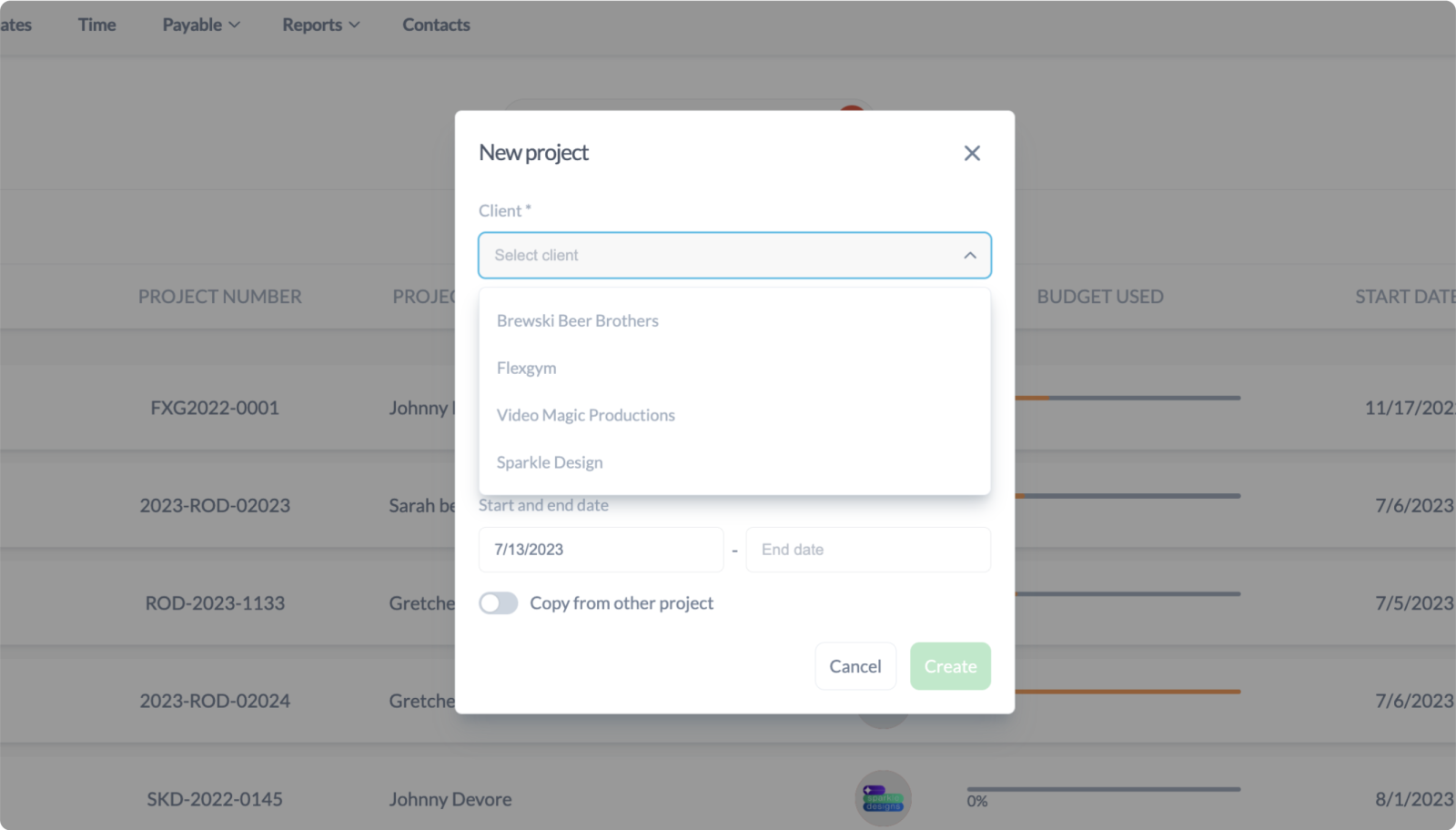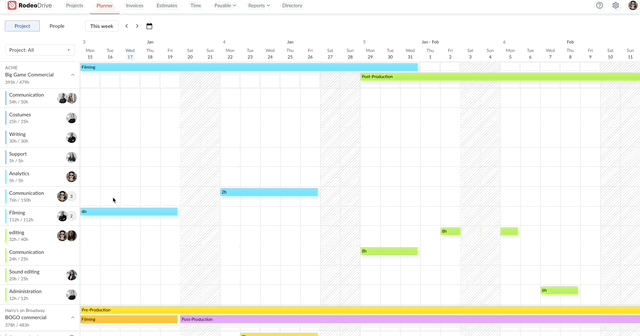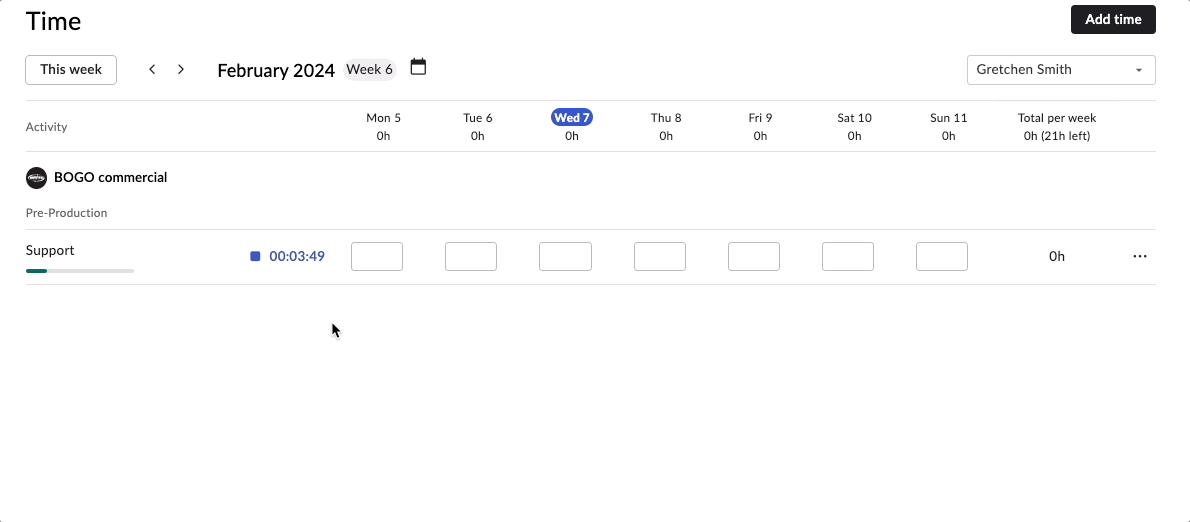A Comprehensive Guide on How to Become a Project Manager
By 2027, the Project Management Institute estimates that businesses worldwide will need almost 90 million people working in project management-oriented roles. However, there aren’t currently enough project managers to meet that need.
Consequently, the talent gap resulting from this lack of project managers may result in a loss of $207.9 billion in GDP by 2027, PMI reports.
All of this might leave you wondering how you can take advantage of this projected demand and become a project manager yourself. If so, you’ve found yourself in the right place. In this blog, we’ll share everything you need to know to break into the project management field.
What is project management?
Simply put, projects are comprised of a set of activities that must be completed to achieve certain company objectives or goals, and project management is the way you go about seeing those projects through to completion.
Additionally, projects are temporary activities that are constrained by a set timeline or budget, which sets them apart from other types of regular activities or tasks an organization might engage in.
For instance, a marketing department might be constantly updating the company's social media accounts, but they might also be working on a marketing campaign to launch a new product. Because the campaign is on a timeline and has a dedicated budget, it’s considered a project, whereas social media management isn’t.
Project management is comprised of numerous methodologies and techniques that can help structure your work and increase your team’s likelihood of success. A marketing team might use the Kanban method to better visualize their project progress, for instance.
If you’re new to project management, the good news is that there are project management software tools out there that can help make your life easier when it comes to managing projects. We’ll explain what you should look for in the right project management software later on in this blog.
What does a project manager do?
Project managers are the ones who lead the project team from start to finish. They’re often tasked with writing the project proposal, building a budget, assigning tasks, and monitoring progress throughout.
In addition to managing the workloads of their team members, they’re also the ones in charge of keeping stakeholders and clients informed of progress and mitigating issues as they arise.
Here’s a look at some of the project activities that project managers are usually responsible for:
- Selecting a project management methodology that’s conducive to the project scope
- Defining the project scope and preventing scope creep
- Building a budget and getting it approved by the client or stakeholders
- Developing a feasible project timeline
- Task management
- Managing project costs
- Identifying and mitigating project risks
- Workload management and balancing team capacity
- Regularly updating the client on project progress
- Quality control of the final deliverables
Long story short — project managers are in charge of a lot, and this is by no means an exhaustive list. Generally, high-level issues related to project scope, timeline, or budget are all within the project manager’s responsibilities.
Skills required to become a project manager
As you might imagine, overseeing a project throughout its many stages requires a variety of different project management skills. Most of these skills can be divided into two categories: soft skills — which are learned through experience — and hard skills, which are more usually learned through education and training.
Soft skills
Soft skills are often referred to as “people skills.” In other words, many soft skills are interpersonal and related to how you manage relationships among the team and navigate conflict as a team leader.
While there are so many soft skills that are important for project managers, here’s a glance at three key skills:
#1 Communication
Communication is the foundation of teamwork. As a project manager, it will be your job to manage communication among stakeholders and facilitate collaboration among your team.
There are many aspects of communication that you might not consider until you find yourself in the position of project manager. For example, how often will your team provide status updates to the client? What communication channels are best for regular discussions among the team, and which should be used for more important matters?
Many project managers create a project communication plan to help manage all of these moving parts. However, strong communication skills are learned, so any experience working within larger project teams will certainly prove beneficial.

#2 Critical thinking
When working on a project, you’re given a set of objectives and it’s your job to figure out how to achieve them. Oftentimes, this requires project managers to think outside the box.
Seasoned project managers know that projects don’t always go as planned. For instance, scope creep is a common problem where the client changes the project requirements after the work is already underway, leaving project managers scrambling to still deliver the project on time and within budget. Strong critical thinking skills allow you to overcome these sorts of problems on the fly.

#3 Conflict resolution
Dealing with conflict is usually an unavoidable part of leading a project team. Team members might have differing opinions on the best course of action for a project, or disagreements when working on the same project task.
Conflict resolution might feel uncomfortable for project managers who’ve never led a team before, as it’s certainly a learned skill. That said, the best way to handle it is by sitting down with the involved parties and making sure everyone feels heard. If possible, try to create a compromise and develop an action plan with the next steps.
More than anything, try to assume the role of mediator rather than creating further conflict by picking a side and causing additional frustration.

Hard skills
Hard skills are the opposite of soft skills. While they’re certainly sharpened through experience and practice, they’re foundationally established via formal education and training.
Let’s take a look at a few examples of hard skills you can expect to use as a project manager:
#1 Research
Research is a critical component of any project planning process. This might involve an in-depth examination of industry trends, or perhaps a look at the outcomes of previous projects with similar objectives.
Especially if you’re submitting a project proposal for consideration, you’ll want to have the skills to find data and statistics related to your project topic that boost your credibility and increase the likelihood that the client will select your project team.

#2 Budgeting
Project managers are oftentimes tasked with determining how to allocate budget resources, which can be a huge undertaking without the right experience. Part of the challenge is that stakeholders’ desired spending budget might be less than the amount that you believe the project needs.
More than anything, you’ll need to know how to prioritize. Those with good budgeting skills know how to determine what items absolutely need funding versus which can be pushed to the back burner for now. That said, those lacking budgeting expertise will find that project budget management software can help reduce the learning curve.

#3 Task management
Creating a solid project plan is one thing, but knowing how to turn those plans into action items is a whole different skill. This is why task management skills are important, as you’ll need to coordinate which team members are working on which tasks and when in order to keep the project moving at the right speed.

And, although assigning tasks to your team might sound like a simple job, you’ll quickly realize that it’s a delicate balancing act to ensure that everyone has enough to work on without burning them out by putting too much on their plate at once.
Pathways to becoming a project manager
So, you think you have the skills to become a project manager. But how can you actually go about doing so?
The route you should take depends on where you are in your career and your level of existing education and experience. Those who are earlier on in their career may be able to opt for a more traditional and specialized approach, whereas those with less experience will want to start by gaining any experience they can.
Let’s take a look:
Traditional approach
The more traditional approach to becoming a project manager involves a high degree of formal education, training, and certification — usually starting with a bachelor’s degree. Although this isn’t always necessary to ultimately receive certification, it’s much easier to become certified from PMI with a four-year degree under your belt.

Those taking a more traditional approach to the project management career path tend to specialize in a particular industry early on as well. Having your experience consolidated in a single field makes it easier to find opportunities within that field.
For example, many people specialize in construction, IT, or real estate, as the structure of projects in these industries might look significantly different than in more creative fields. That isn’t to say that you can’t be successful as a generalist capable of working in any field, but specializing is a good way to speed up your career trajectory.
And finally, once you’ve specialized, the final step to becoming a project manager is typically to seek a project management certification. We’ll break down everything you need to know about certifications in the next section, but it’s important to select a certification that’s in line with your goals and the methodology that aligns with your industry.
Do-it-yourself approach
If you didn’t go to college or if you’re looking to pivot into a project management career, don’t stress! Many successful project managers didn’t follow the traditional path.
In fact, many people become project managers without realizing it. For example, a marketer who oversees a team that exclusively works on campaigns is a project manager, whether they realize it or not. Their job involves budgeting, task assignments, and scope management, just like the job of any other project manager.
The key to pursuing a less conventional project manager pathway is getting as much experience as you can. Use PMI’s resources to your advantage, and seek out entry-level positions where you’ll have the opportunity to work under a project manager. Use these opportunities to ask questions and learn as much as you can.
Additionally, there are many certifications that require either no experience or just a secondary degree, if you’re looking to take that next step toward more formalized training.
Identifying the right project management certification
For those looking to break into project management positions, having a certification can provide potential employers with the extra assurance that you have the necessary skills to manage projects, even if you might lack work experience.
Certification is a common route many people take to become project managers. In fact, 1.6 million people worldwide hold some sort of PMI certification, which doesn’t even include the people who are certified through other organizations.
Below, we’ll explore five of the most common types of certifications. Some are entry-level certifications centered around project management more broadly, whereas others are focused on a particular methodology, such as agile or Scrum.
Certified Associate in Project Management (CAPM)
If you’re looking to break into entry-level project management roles, then the CAPM certification is for you. The CAPM is administered by the Project Management Institute, and it’s an excellent stepping stone to the PMP certification, which we’ll cover in more detail below.
The CAPM certification typically equips you with the skills for roles like project coordinator, associate project manager, or junior project manager. To become CAPM certified, you’ll need to pass one exam, which costs about $300 for non-PMI members. You’ll also need to meet the below prerequisites.
Prerequisites for certification
Before you can sit for the CAPM exam, you need to have a secondary degree (such as a high school diploma or GED) and must have completed at least 23 contact hours of project management education, which you can fulfill by enrolling in PMI’s online Project Management Basics course.
Project Management Professional Certification (PMP)
If the CAPM is too much of a junior certification to meet your needs, then the PMP certification is the one you should look into. The PMP is also offered by the PMI, and it’s a globally recognized certification that’s widely considered to be a rigorous, gold-standard program.
A PMP certification verifies that you are skilled in leading a project team, have a process for determining the best way to approach a project, and understand the role projects play within larger organizational goals. The certification requires you to pass a 180-question exam, which proves that you’re equipped to lead projects for any organization in any industry.
A higher salary is one of the main reasons why over a million people worldwide have chosen to pursue this certification. The median salary for people who are PMP certified is 32% higher in the U.S. and 16% higher globally.
Additionally, a PMP certification is also desirable for those hoping to work in a project management office once they have project experience under their belt.
Prerequisites for certification
The PMP offers two sets of prerequisites. As long as you satisfy one of them, you’re good to go. As you’ll see below, the main difference between them is that individuals with a four-year degree don’t need as many years of project management experience to qualify.
Option 1: You have a high school diploma or associate’s degree, 5 years of project management experience, and 35 hours of project management training (or have the Certified Associate in Project Management Certification).
Option 2: You have a four-year degree, 3 years of project management experience, and 35 hours of project management training (or the CAPM certification).
Note: The PMP certification requires you to earn 60 Professional Development Units (PDUs) every three years. PDUs are essentially a measurement of the ongoing training you’ve completed to continue to grow your project management skills.
Agile Certified Practitioner Certification (ACP)
The Agile Certified Practitioner certification is yet another certification from the Project Management Institute, although this one verifies that you have a robust understanding of agile principles and techniques with the experience to match.
The ACP certification involves a variety of agile approaches — such as Kanban, Lean, and Test-Driven Development. The ACP exam is 120 questions and costs $495 for non-PMI members.
Prerequisites for certification
Once again, the ACP certification has two sets of prerequisites and you must satisfy one. You’ll notice that you’re required to have some existing work experience with the agile methodology to qualify.
Option 1: You have a secondary degree and 21 contact hours of agile project management training, 16 months of project experience (in the last 5 years), and 12 months of agile project work experience (in the last 3 years).
Option 2: You have a four-year degree, 12 months of project experience (in the last 5 years), and 8 months of agile project work experience (in the previous 3 years).
Note: To maintain your Agile certification, you’ll need to earn 30 PDUs in Agile topics every three years.
Certified ScrumMaster (CSM)
The Certified ScrumMaster course is offered by the Scrum Alliance, and it teaches you everything you need to know about the Scrum framework and how to apply it to your team. This is an entry-level course, so even newcomers can become Scrum certified.
The course involves a minimum of 14 hours of training led by an expert instructor, and at the end of the course, you must pass a 50-question exam.
Prerequisites for certification
Good news — since this is a course and not just a certification exam, there are no prerequisites for CSM. Anyone can sign up to become a Certified ScrumMaster.
Projects in Controlled Environments Certification (PRINCE2)
The PRINCE2 certification is offered by AXELOS, and it serves to help you understand the how-tos of delivering projects on time, to scope, and within budget.
It will help you understand how your project should move through its various phases in a structured way in line with the PRINCE2 methodology. AXELOS offers three different types of PRINCE2 certifications to fit your level of experience and skill needs.
Prerequisites for certification
If you’re interested in the entry-level PRINCE2 certification — known as the PRINCE2 Foundation certification — there are no prerequisites.
However, to attain the higher-level PRINCE2 Practitioner certification, you need to have passed one of the following exams: PRINCE2 Foundation (5th or 6th edition), PMP certification, CAPM certification, or the International Project Management Association Level A, B, C, or D.
Tips for becoming a project manager without a certification
If you’re not ready to commit to a certification or if you’re just curious to learn more about project management, there are other places to start.
Here are three steps we recommend taking if you want to become a project manager:
1. Learn about the various project management methodologies
Familiarizing yourself with the various project management methodologies is a good first step for anyone looking to become a project manager. Your methodology is the framework for your project, as many methods outline exactly how you should organize and plan your team’s workload.
Because project management can be used across so many different industries, there are thousands of methodologies. Some require certification, whereas for others, certification is helpful but not necessary.
In general, though, the methodologies we’ll cover below are typically the most common and the ones you should certainly know about if you’re trying to break into the field:
- Waterfall project management: A straightforward and more traditional approach where a linear project plan is created and executed based on the requirements of your project.
- Agile project management: A sprint-based approach to projects where work is completed in short cycles, allowing the team to iterate on the project plan as necessary along the way rather than following a set, linear plan.
- Critical path method: A strategy where project managers use task mapping to determine the minimum time to complete the project work, which then shapes the creation of the project schedule.
- Scrum project management: A highly flexible agile methodology where certified team members in specified roles (like the product owner or Scrum master) oversee progress on team sprints.
- Kanban project management: A highly visual method where tasks are added to a board with columns representing each stage of the project. The tasks then move through the board as they progress, which allows all team members to see where everything’s at.
Related: Kanban vs. Scrum: Understanding the Key Differences
2. Get whatever hands-on experience you can
Training and education can only get you so far in project management. For the most part, you’ll need to learn by doing, which is why it’s crucial to gain as much hands-on experience as possible.
Even an entry-level role as a project team member or as a freelancer can help you gain insight into the process and how the project management methodologies work in practice. Under the leadership of a successful project manager, you’ll be able to observe which skills they use on a daily basis, which you can then work on for yourself.
And if there’s a specific industry you’re hoping to become a project manager in, relevant experience in the industry instead of project-specific experience might also be beneficial. Some industries — like software development — require a high level of skill that’s more important than your project management abilities.
3. Familiarize yourself with project management tools
Being a project manager is like juggling a dozen different things at once. Without a little additional support, you’re sure to drop the ball every once in a while.
That’s why project management tools have become an absolutely essential resource for almost every project team. Project management software can serve as a centralized place to store your project information and support certain project functions that tend to easily become tedious — like time tracking and timesheets, for example.

Some project management software requires you to use multiple tools and integrate them to achieve a complete solution, whereas others — like Rodeo Drive — are truly all in one, meaning every feature you need to manage your projects is available in just one tool.

Here’s a look at some of the things Rodeo Drive can do in-app:
- Budgeting: Easily build phased budgets to ensure all of your time activities and expenses are accounted for before sending an estimate to your client.
- Estimates: Export the budget you’ve built and send it to your client as an estimate directly from Rodeo Drive's platform. Plus, your estimates are fully customizable.
- Task planning: Assign tasks to your team based on their availability so you can manage everyone’s workload effectively to prevent burnout.
- Time tracking: Your team can effortlessly record their time through Rodeo Drive, either using our stopwatch feature or by adding a timecard after the fact.
- Invoicing: When it’s time to bill clients, you can do so directly through Rodeo Drive — complete with your own branding, terms and conditions, and notes.
- Reporting: Keep an eye on your team and project progress using Rodeo Drive’s automatically generated reports, which can give you insights into things like employee productivity and project profitability.
Why not come test it out for yourself? Schedule a demo to learn more or sign up for free today.







